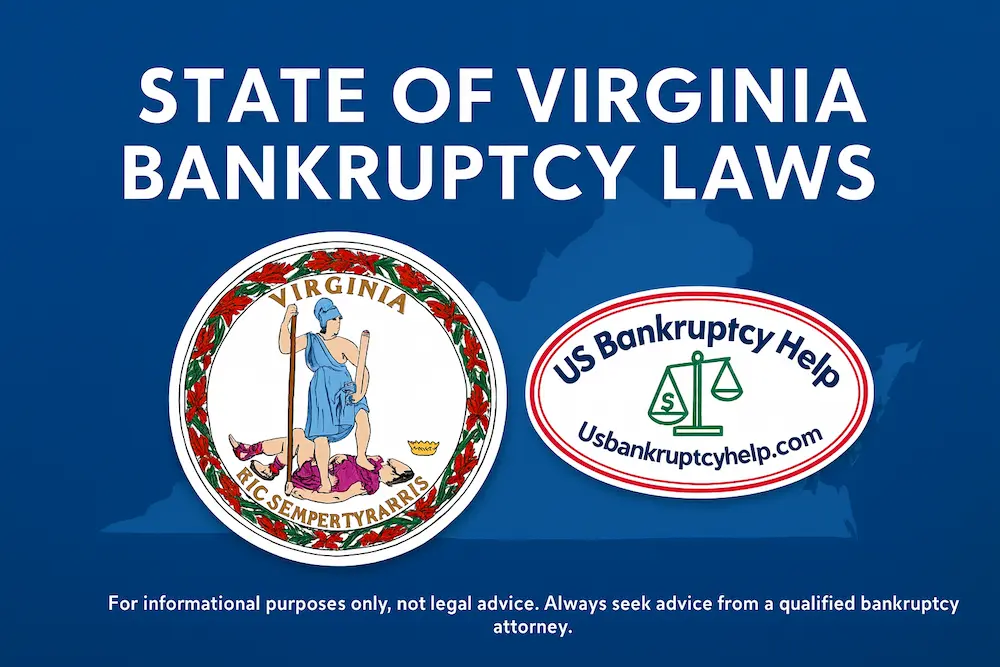

State of Virginia Bankruptcy Laws: What You Need to Know
The state of Virginia bankruptcy laws can be confusing when you’re the one getting collection calls, wage garnishments, or foreclosure notices. If you’re thinking about filing bankruptcy in Virginia, you need clear, practical information—not legal jargon—so you can understand your rights and make smart decisions for yourself and your family.
State of Virginia Bankruptcy Laws — At a Glance
- How State and Federal Law Work Together — Virginia uses the federal Bankruptcy Code and procedures, but state of Virginia bankruptcy laws decide what property is exempt and how certain rights are treated when you file.
- Main Bankruptcy Options in Virginia — chapter 7 for faster relief from unsecured debt, chapter 13 for a 3–5 year repayment plan, and chapter 11 for businesses or very high-debt individuals.
- Filing Bankruptcy in Virginia: Big-Picture Steps — choose a chapter, complete credit counseling, file in the correct district, get the automatic stay, attend the 341 meeting, complete debtor education, and obtain a discharge.
- Eastern District of Virginia Bankruptcy Court & Western District — which counties go to which district, where the main court locations are, and why you can’t pick your district based on preference.
- Virginia Exemptions and Opting Out of Federal Exemptions — Virginia has opted out of the federal exemption scheme, so most filers use Title 34 of the Code of Virginia to protect home equity, wages, and personal property.
- Role of the Trustee and Court — how the trustee’s job differs in chapter 7 (administering any non-exempt assets) versus chapter 13 (reviewing your plan and distributing payments), and what the judge actually decides.
- Automatic Stay & Creditor Actions — what collection activity must stop when you file, and how the stay helps with garnishments, foreclosures, repossessions, and lawsuits.
- Credit Counseling, Debtor Education, and Required Documents — approved courses, tax returns, pay stubs, bank statements, and ID you’ll need for a smooth case in the Eastern or Western District of Virginia.
- Alternatives to Bankruptcy in Virginia — when nonprofit debt-management plans, settlements, or hardship arrangements might help, and red flags with for-profit “debt relief” companies that tell you to stop paying your creditors.
- FAQs About Filing Bankruptcy in Virginia — how to file, typical costs, credit-score impact, and whether you can keep your home under Virginia exemption laws and the chapter you choose.
In this guide, we walk through how bankruptcy works in Virginia, how federal law and state law fit together, and what really happens when you file. We’ll cover the main bankruptcy chapters, exemptions that protect your property, the Eastern and Western District bankruptcy courts, and what to expect from start to finish so you can see whether bankruptcy is a realistic path to a fresh start.
Overview of State of Virginia Bankruptcy Laws
State of Virginia bankruptcy laws sit on top of the federal Bankruptcy Code (Title 11 of the United States Code) and the Federal Rules of Bankruptcy Procedure. Your case is filed in federal bankruptcy court, but Virginia law decides what property is exempt and how certain rights are treated when you file bankruptcy in Virginia.
Virginia has opted out of the federal bankruptcy exemption scheme under Va. Code § 34-3.1. That means most people must rely on Virginia’s own exemption statutes in Title 34 of the Code of Virginia (“Homestead and Other Exemptions”), including the homestead exemption in Va. Code § 34-4 and related protections in Va. Code § 34-26, § 34-27 and § 34-29, when they protect their home, wages, and personal property. To file bankruptcy in Virginia, you must have lived in the state for at least 91 days.
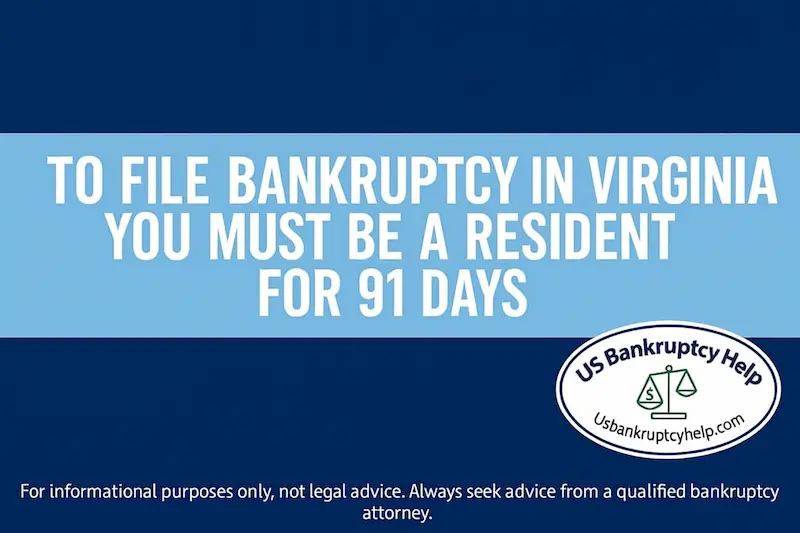
On the procedural side, bankruptcy in Virginia follows the Federal Rules of Bankruptcy Procedure plus local rules adopted by the Eastern and Western District of Virginia bankruptcy courts. Those rules control things like how petitions are filed, deadlines, hearings, and plan confirmation.
Substantively, the main options under state of Virginia bankruptcy laws are the familiar federal chapters: chapter 7 for faster debt relief when you cannot reasonably repay what you owe, chapter 13 for a structured repayment plan over three to five years, and chapter 11 for businesses (and some high-debt individuals) that need a more complex reorganization.
In practice, bankruptcy in Virginia is designed to:
- Give you a legal path to discharge or restructure qualifying debts.
- Stop most collection activity immediately through the automatic stay.
- Let you rebuild on a more solid financial foundation under clear state and federal rules.
Types of Bankruptcy Available in Virginia
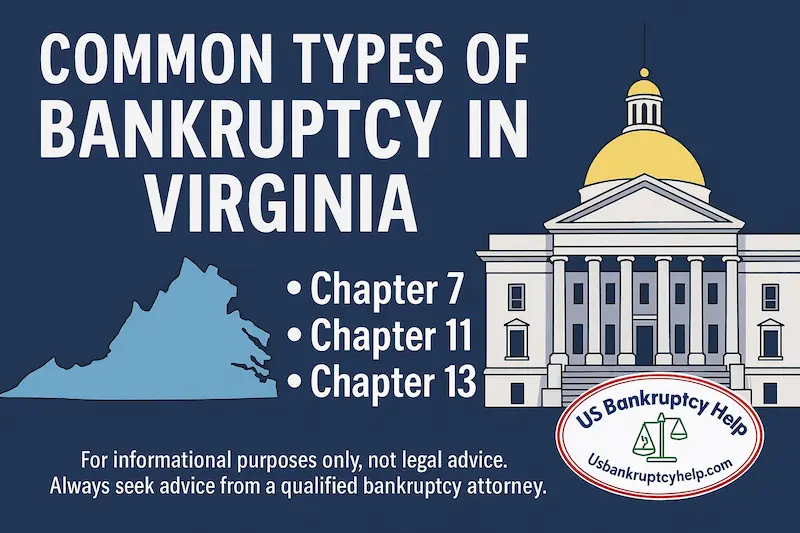
When people talk about bankruptcy in Virginia, they are usually talking about a case filed under the federal Bankruptcy Code in one of Virginia’s bankruptcy courts. The state of Virginia bankruptcy laws determine what property you can protect, but the basic “flavors” of bankruptcy come from federal law.
For individuals filing bankruptcy in Virginia, the most common chapters are:
- Chapter 7 – a quicker path to wiping out qualifying unsecured debts when you cannot reasonably repay them.
- Chapter 13 – a court-approved repayment plan, usually three to five years, that lets you catch up on secured debts and protect assets.
- Chapter 11 – a reorganization tool most often used by businesses or very high-debt individuals.
Each chapter has its own eligibility rules. For example, chapter 7 usually requires you to pass a means test that looks at your income and expenses, and chapter 13 generally requires steady income and staying within certain debt limits. Which chapter fits you best depends on your budget, the type of debts you have, and how much property you need to protect under state of Virginia bankruptcy laws.
This Virginia overview is meant to help you see the landscape at a glance. If you are actively comparing your options, it helps to move from this hub page into the more detailed guides:
- Detailed guide to Chapter 7 bankruptcy in Virginia
- Detailed guide to Chapter 13 bankruptcy in Virginia
- Virginia bankruptcy exemptions overview
- National Chapter 11 bankruptcy guide
Selecting the right chapter depends on your income, assets, types of debt, and long-term goals. A consultation with a Virginia bankruptcy attorney can help you decide which path fits your situation best.
Filing Bankruptcy in Virginia: The Process
When you are thinking about filing bankruptcy in Virginia, the process can look mysterious from the outside. In reality, most cases in the Eastern and Western Districts of Virginia follow a predictable set of steps, whether you file under chapter 7, chapter 13, or another chapter.
Here’s a brief, big-picture outline of how filing bankruptcy in Virginia usually works:
- Choose the bankruptcy chapter: Review your income, assets, and goals to decide whether chapter 7, chapter 13, or another chapter is the best fit. This is where tools like the means test and Virginia’s exemption laws come into play.
- Complete pre-filing credit counseling: Before you can file your case, you must complete a credit counseling session with an approved agency and obtain a completion certificate.
- Prepare and file the petition: You (and your attorney, if you have one) gather detailed information about your income, expenses, debts, and property, then file the bankruptcy petition, schedules, and related forms with the correct Virginia bankruptcy court.
- Automatic stay and trustee review: Once your case is filed, the automatic stay generally stops most collection activity. A trustee is assigned to your case and reviews your paperwork, documents, and exemptions.
- Attend the 341 meeting of creditors: You answer questions under oath from the trustee (and any creditors who appear) about your finances and the information in your filing.
- Complete debtor education and finish requirements: After filing, you must complete a debtor education course. In a chapter 7 case, you typically receive a discharge of qualifying debts once all requirements are met. In a chapter 13 case, you complete your plan payments before the court enters a discharge.
An experienced Virginia bankruptcy attorney can help you navigate each step, avoid common mistakes that delay or derail cases, and make sure your filing complies with both the Bankruptcy Code and state of Virginia bankruptcy laws.
Required Documentation and Forms
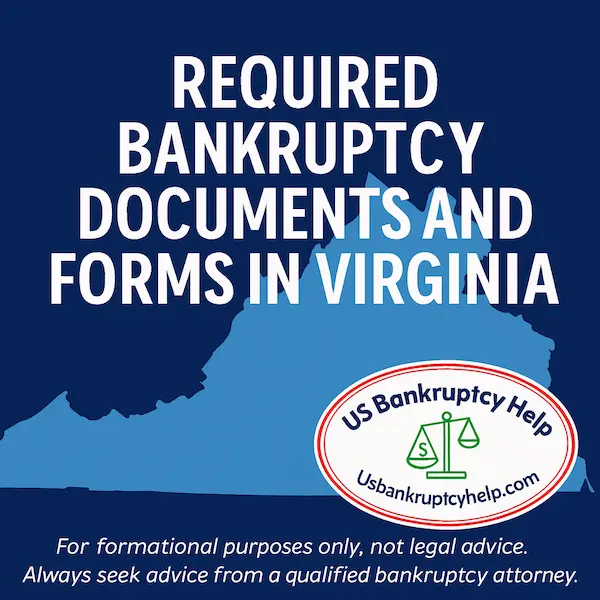
Filing bankruptcy in Virginia is paperwork-heavy. The court, trustee, and U.S. Trustee all rely on your documents and forms to understand your complete financial picture, so careful preparation here can make the rest of the case much smoother.
At a minimum, most Virginia bankruptcy cases require:
- Bankruptcy petition and schedules: These are the core forms that list your assets, debts, income, expenses, recent financial history, and basic personal information.
- Statement of Financial Affairs (SOFA): This form covers recent transfers, lawsuits, income history, business interests, and other transactions the court and trustee need to review.
- Proof of income and expenses: Recent pay stubs, profit-and-loss statements if you are self-employed, tax returns (usually the last two years), and sometimes bank statements or other records to support the numbers in your schedules.
On top of the official bankruptcy forms, you will also need to provide a copy of your most recent tax return to the trustee, along with identification documents such as a photo ID and proof of your Social Security number before the 341 meeting of creditors.
The official federal bankruptcy forms are available through the U.S. Courts website at uscourts.gov, but completing them correctly under state of Virginia bankruptcy laws and local court rules can be challenging if you are unfamiliar with the process. Many people choose to work with a Virginia bankruptcy attorney so their forms are accurate, complete, and filed with the correct court the first time.
Credit Counseling and Debtor Education
Before you can file bankruptcy in Virginia, the law requires you to complete apre-filing credit counseling session with an approved agency. This course reviews your income, expenses, and options (including bankruptcy and non-bankruptcy alternatives) and ends with a completion certificate that must be filed with your bankruptcy petition.
After your case is filed, you must also complete a separate post-filing debtor education course. This second class focuses on budgeting, credit use, and long-term financial planning. In most chapter 7 and chapter 13 cases, you will not receive a discharge until the debtor education provider issues a certificate and it is filed with the court.
The U.S. Trustee Program maintains the official lists of approved credit counseling and debtor education providers for the Eastern and Western District of Virginia. You can find them here:
Choosing an approved provider and timing these courses correctly is important. A Virginia bankruptcy attorney can help you make sure your certificates are in order so that filing bankruptcy in Virginia goes smoothly and your discharge is not delayed.
Eastern District of Virginia Bankruptcy Court & Western District of Virginia Bankruptcy Court
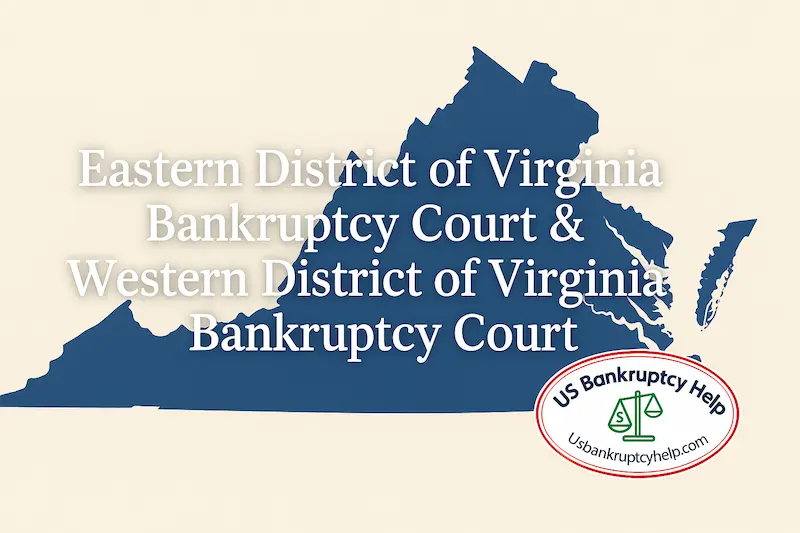
If you file bankruptcy in Virginia, your case will be assigned to either the Eastern District of Virginia bankruptcy court or the Western District of Virginia bankruptcy court, depending on where you live. Each district has multiple divisional offices, and your hearing location is tied to your county and division.
You do not pick the district based on preference—the court is determined by geography and federal district boundaries. The tables below list the main bankruptcy court locations for each district so you can see where cases are filed and hearings are typically held.
| District / Division | Address & Phone | Website |
|---|---|---|
| Eastern District of Virginia — Richmond Division | U.S. Bankruptcy Court 701 East Broad Street, Suite 4000 Richmond, VA 23219-1888 (804) 916-2400 | U.S. Bankruptcy Court — Eastern District of Virginia |
| Eastern District of Virginia — Alexandria Division | U.S. Bankruptcy Court 200 S. Washington St. Alexandria, VA 22314-5405 (703) 258-1200 | U.S. Bankruptcy Court — Eastern District of Virginia |
| Eastern District of Virginia — Norfolk Division | U.S. Bankruptcy Court 600 Granby Street, 4th Floor Norfolk, VA 23510 (757) 222-7500 | U.S. Bankruptcy Court — Eastern District of Virginia |
| Eastern District of Virginia — Newport News Division | U.S. Bankruptcy Court 2400 West Avenue Newport News, VA 23607 (757) 244-3678 | U.S. Bankruptcy Court — Eastern District of Virginia |
| District / Division | Address & Phone | Website |
|---|---|---|
| Western District of Virginia — Roanoke (Main Office) | U.S. Bankruptcy Court 210 Church Ave., Room 200 Roanoke, VA 24011 (540) 857-2391 | U.S. Bankruptcy Court — Western District of Virginia |
| Western District of Virginia — Harrisonburg Division | U.S. Bankruptcy Court 116 N. Main St., Room 223 Harrisonburg, VA 22802 (540) 434-8327 | U.S. Bankruptcy Court — Western District of Virginia |
| Western District of Virginia — Lynchburg (Hearings Only) | U.S. Bankruptcy Court 1101 Court St. Lynchburg, VA 24504 (540) 857-2391 | U.S. Bankruptcy Court — Western District of Virginia |
Most filings are submitted electronically, but these locations are the physical hubs for the Eastern District of Virginia bankruptcy court and the Western District of Virginia bankruptcy court. They host hearings, in-person services for self-represented filers, and other official court business. If you are unsure which district or division covers your county, you can check the district’s website or ask your Virginia bankruptcy attorney to confirm before you file.
The Role of the Bankruptcy Trustee and Court
When you file bankruptcy in Virginia, your case is handled by both the bankruptcy court and a bankruptcy trustee. The court is the judge of your case; the trustee is the day-to-day administrator. Together, they make sure your case follows the Bankruptcy Code, the Federal Rules of Bankruptcy Procedure, and state of Virginia bankruptcy laws.
In most chapter 7 and chapter 13 cases, the United States Trustee Program appoints a private trustee. In a chapter 7 case, the trustee’s primary job is to identify and administer any non-exempt assets (if there are any) and distribute the proceeds to creditors. In achapter 13 case, the trustee’s role is different: they review your proposed repayment plan, make sure it follows the rules, and then receive and distribute your plan payments to creditors once the plan is confirmed.
Typical trustee responsibilities include:
- Reviewing your petition, schedules, and supporting documents for accuracy.
- Evaluating your use of exemptions and any non-exempt property in the case.
- Conducting the section 341 meeting of creditors and asking questions under oath about your finances.
- In chapter 7 cases, administering and liquidating non-exempt assets when required and distributing the proceeds to creditors.
- In chapter 13 cases, monitoring your repayment plan, receiving plan payments, and distributing those funds to creditors according to the confirmed plan.
The bankruptcy judge, on the other hand, decides legal disputes, confirms chapter 13 plans, rules on objections, and ultimately enters the discharge order if you meet the requirements. The court does not manage your payments or sell property—that is the trustee’s job.
Finding Virginia Chapter 7 and Chapter 13 Trustees
The United States Trustee Program maintains the official lists of chapter 7 panel trustees and chapter 13 standing trustees who serve the Eastern and Western Districts of Virginia. You can confirm the current trustees for Virginia by using these resources:
- U.S. Trustee Program — List of Chapter 7 Panel Trustees
- U.S. Trustee Program — List of Chapter 13 Standing Trustees
If you already have a case number, your notice from the court will identify your assigned trustee. A Virginia bankruptcy attorney can also help you understand how your trustee and the court will interact in your particular chapter 7 or chapter 13 case.
How Exemptions Work Under State of Virginia Bankruptcy Laws
Under state of Virginia bankruptcy laws, exemptions are the rules that decide what property you are allowed to keep when you file bankruptcy in Virginia. Virginia has opted out of the federal bankruptcy exemption scheme, so most filers must use Virginia’s own exemption statutes in Title 34 of the Code of Virginia, plus a few limited federal non-bankruptcy exemptions.
In a chapter 7 case, exemptions are critical because they determine which assets are protected and which, if any, the trustee can administer for the benefit of creditors. In a chapter 13 case, exemptions still matter, but mainly for calculating how much your unsecured creditors must receive over the life of your repayment plan.
This page only gives a high-level overview. For specific categories, limits, and planning strategies, see our dedicated Virginia bankruptcy exemptions guide, which is the main resource on this site for exemption details in Virginia.
Virginia Bankruptcy Laws and The Automatic Stay
When you file for bankruptcy in Virginia, an automatic stay goes into effect immediately. This legal measure stops most collection efforts by creditors during the bankruptcy process.
The automatic stay prevents:
- Foreclosure proceedings.
- Repossession efforts.
- Harassment from collectors.
It offers a breathing space for debtors to manage their financial affairs under the court's protection.
Bankruptcy in Virginia: The 341 Meeting of Creditors
After you file bankruptcy in Virginia and a trustee is assigned, the next big milestone is the section 341 meeting of creditors. This is a short, relatively informal hearing—usually 5 to 15 minutes—where the trustee verifies your identity and asks questions about the information in your bankruptcy papers.
Despite the name, creditors rarely show up in routine chapter 7 or chapter 13 cases. In most Virginia cases, the only people present are you, your attorney (if you have one), the trustee, and possibly other filers waiting for their turn. There is no judge at the 341 meeting, and no one is trying to embarrass you; the trustee’s job is to make sure your paperwork is complete, accurate, and consistent with state of Virginia bankruptcy laws.
At a typical 341 meeting in the Eastern or Western District of Virginia, you can expect to:
- Show a valid photo ID and proof of your Social Security number.
- Confirm that you read and signed your petition, schedules, and statements.
- Answer basic questions under oath about your income, assets, debts, and recent financial activity.
If something in your documents needs clarification or an update, the trustee may ask for additional information after the meeting. As long as you are honest, prepared, and responsive, the 341 meeting is usually a manageable and straightforward step on the path toward your discharge or plan confirmation.
Alternatives to Bankruptcy in Virginia
A Brief, Attorney-Led Overview
Bankruptcy isn’t the only path to dealing with debt in Virginia, but it is often the most predictable legal remedy when you’re facing realities like wage garnishments, repossession threats, or a pending foreclosure. If you’re exploring options, do it with an experienced Virginia bankruptcy lawyerso you don’t trade short-term relief for long-term damage.
When Non-Bankruptcy Options May Help
- Nonprofit Credit Counseling / DMP: A structured plan to lower interest rates and consolidate unsecured credit cards into one payment. A good track record of on-time payments can help with credit rebuilding, but these plans usually do not stop lawsuits or garnishments that are already in motion.
- Direct Negotiation / Settlements: Case-by-case lump-sum or installment settlements with individual creditors. This can make sense if you have a limited number of accounts and can fund realistic offers. You still face lawsuit risk while negotiations drag on, and forgiven balances may create taxable income.
- Refinance / Consolidation Loans: Sometimes lowers interest and simplifies payments if you qualify. But rolling unsecured debt into a home equity loan or car loan can turn a credit-card problem into a house-or-car problem if you later default.
- Short-Term Hardship Arrangements: Temporary forbearance or reduced payments after a job loss, medical event, or other short-term setback. Helpful when income will realistically recover soon, less helpful when the numbers simply don’t work anymore.
Red Flags With For-Profit “Debt Relief” Companies
- Pressure to pay large upfront fees or monthly “program fees” before any meaningful results.
- Advice to stop paying all your creditors so accounts “go delinquent” and become easier to settle—often leading to lawsuits, judgments, and garnishments while you’re still in the program.
- Promises of guaranteed results, “one payment solves everything,” or claim that “bankruptcy is never necessary” without carefully reviewing your full financial picture.
- No clear, written explanation of tax consequences, lawsuit risk, or the fact that creditors are free to refuse settlements and keep collecting.
Why Many Virginians Still Choose Bankruptcy
- Immediate legal protection: The automatic stay can stop most collection lawsuits, garnishments, repossessions, and foreclosure actions once a case is filed.
- Predictable end point: Chapter 7 typically leads to a discharge of qualifying debts in a matter of months, while chapter 13 provides a structured, court-enforced repayment plan with a clear timeline.
- Built-in asset rules: State of Virginia bankruptcy laws and the exemption system provide a transparent framework for what you keep and what, if anything, must be paid to creditors.
Best Practice: Compare Paths With Counsel
Before you commit to a for-profit “debt consolidation” or “debt relief” program, have a Virginia bankruptcy attorney review your debts, income, assets, and goals. If a nonprofit debt-management plan or targeted settlement strategy truly beats a chapter 7 or chapter 13 outcome in your situation, a good lawyer will tell you that—and help you avoid companies that put their fees ahead of your long-term financial health.
Common Myths and Misconceptions About Bankruptcy in Virginia
State of Virginia bankruptcy laws are often misunderstood, and those misunderstandings can scare people away from getting real help. A few of the most common myths I hear from Virginia residents include:
- “Bankruptcy ruins your finances forever.” In reality, most people start rebuilding credit within a year or two after a discharge with careful budgeting, on-time payments, and responsible use of new credit.
- “You lose everything if you file.” Virginia’s exemption laws exist precisely so you can keep essential property—like basic household goods, a modest vehicle, and protected equity—while dealing with unaffordable debt.
- “Filing bankruptcy means I’ve failed.” Job loss, medical issues, divorce, and business downturns are common triggers. Bankruptcy is a legal tool built into the system, not a moral judgment on you or your family.
The truth is that bankruptcy, used properly, can be a strategic step toward financial recovery—not the end of the story. If you’re unsure how state of Virginia bankruptcy laws apply to your situation, a conversation with an experienced Virginia bankruptcy attorney can replace fear and myths with clear, fact-based options.
Frequently Asked Questions About Bankruptcy in Virginia
Bankruptcy in Virginia can feel confusing from the outside, but many people share the same core questions. Here are brief answers to some of the most common FAQs—your situation may be different, so always get advice tailored to your specific facts.
How do you file for bankruptcy in Virginia?
Filing for bankruptcy in Virginia starts with choosing the right chapter (usually chapter 7 or chapter 13 for individuals), completing a pre-filing credit counseling course, and gathering detailed information about your income, expenses, debts, and assets. You or your attorney then file a bankruptcy petition and schedules in the correct Virginia bankruptcy court (Eastern or Western District). After filing, you attend a 341 meeting of creditors and complete a post-filing debtor education course before the court can enter a discharge in chapter 7 or at the end of a completed plan in chapter 13.
How much does it cost to file bankruptcy in Virginia?
Everyone filing pays a federal court filing fee (the amount is the same in Virginia as in other states), plus the cost of required credit counseling and debtor education courses, and any attorney’s fees if you hire a lawyer. As of late 2024, the federal filing fee is typically a few hundred dollars for chapter 7 and chapter 13 cases, and attorney fees vary widely based on the complexity of your case and the market in your part of Virginia. Some filers qualify to pay the court fee in installments or, in limited cases, request a waiver in chapter 7. A Virginia bankruptcy attorney can give you a realistic cost estimate up front.
How does bankruptcy affect my credit score in Virginia?
Most people who are considering bankruptcy in Virginia already have damaged credit from late payments, high balances, collections, or judgments. Bankruptcy will appear on your credit report for up to 10 years for chapter 7 and up to 7 years for chapter 13, and your score may initially drop. But for many filers, removing unmanageable debt actually makes it easier to rebuild: you can focus on a budget, on-time payments going forward, and responsible use of any new credit offers you decide to accept after the case.
Can I keep my house if I file for bankruptcy?
Many Virginians do keep their homes through bankruptcy, but it depends on your equity, your mortgage status, and which chapter you file. Virginia’s exemption laws help protect a portion of your home equity, and chapter 13 can be used to catch up past-due payments over time. If there is significant non-exempt equity or the mortgage is far behind, the analysis gets more complicated. Before filing, talk with a Virginia bankruptcy attorney or review our Virginia exemptions and chapter-specific guides so you understand how state of Virginia bankruptcy laws apply to your home.
State of Virginia Bankruptcy Laws: Bringing It All Together
When you are in the middle of collection calls, wage garnishments, or the fear of losing a home or car, it can feel like there is no roadmap. State of Virginia bankruptcy laws are that roadmap—but only if you understand how the federal Bankruptcy Code, Virginia’s exemption system, the Eastern and Western District bankruptcy courts, and the different chapters all fit together.
This page is meant to be your starting point: a high-level guide to filing bankruptcy in Virginia, what the courts and trustees do, how exemptions protect your property, and when alternatives like settlement or nonprofit credit counseling might make sense. The next step is to move from overview to specifics based on your own income, assets, and goals.
If you are seriously considering bankruptcy in Virginia, take advantage of the detailed resources linked on this page—our Virginia chapter 7 guide, Virginia chapter 13 guide and Virginia bankruptcy exemptions guide. Then, sit down with an experienced Virginia bankruptcy attorney to walk through your budget, your property, and your long-term plans.
Bankruptcy is not about giving up; it is about using the tools the law provides to get back to even. With the right information and guidance, state of Virginia bankruptcy laws can help you move from constant crisis back to a financial life that is calmer, more organized, and focused on the future instead of past-due bills.
Explore Our Virginia Bankruptcy Guides
Explore Some of Our National Bankruptcy Guides
- Chapter 7 Bankruptcy: National Guide
- Chapter 13 Bankruptcy: National Guide
- Chapter 7 vs Chapter 13 Bankruptcy: National Guide
- Can Just One Spouse File Bankruptcy?
- Can You File Bankruptcy and Keep Your House?
- Can You File Bankruptcy and Keep Your Car?
- How Often Can You File Bankruptcy?
- Chapter 13 Vehicle Cramdown
Explore Bankruptcy Help by State
Browse our state guides to learn exemptions, means test rules, costs, and local procedures. Use these links to jump between states and compare your options.
- Arizona
- California
- Colorado
- Florida
- Georgia
- Illinois
- Indiana
- Maryland
- Michigan
- New York
- Ohio
- Oregon
- Pennsylvania
- Tennessee
- Texas
- Virginia
- Wisconsin